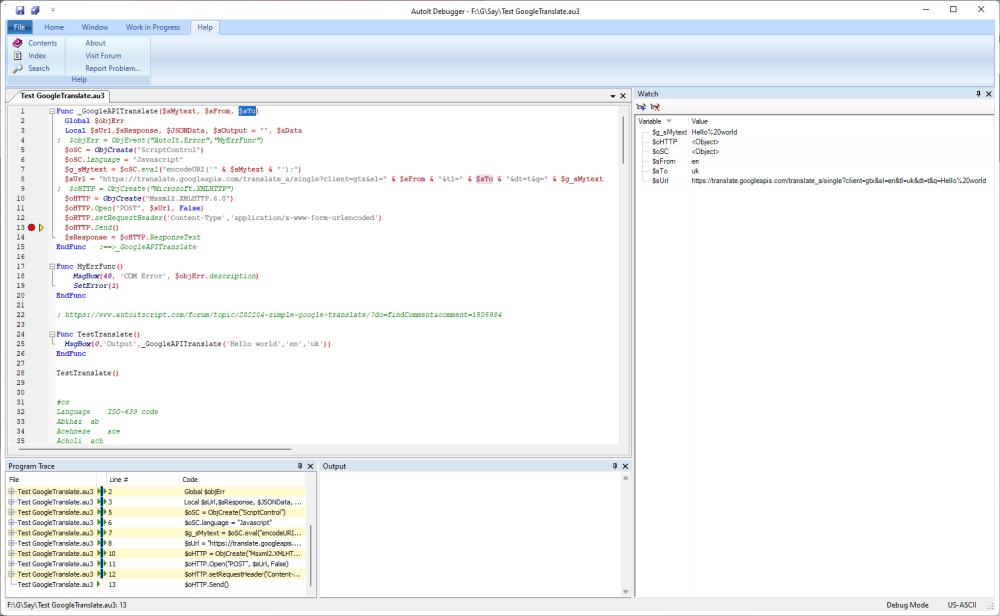Search the Community
Showing results for tags 'object'.
-
This is driving me crazy. This worked flawlessly for months. Two days ago it stopped working with an "The requested action with this object has failed." error. I ran SFC. I restored the entire C drive to the day before from a Macrium Reflect image. I rewrote it to use the WinHttp.au3 UDF. I uninstalled and reinstalled AutoIT. I ran it in Steve Towner's GUI debugger (https://web.archive.org/web/20220401023656/https://www.thefoolonthehill.net/drupal/AutoIt Debugger) and verified the objects were objects. I've Googled the error and gotten many hits, none of which explain WTF should be done. If I un-comment the "$objErr =..." line the error message is "Access is denied". Help?? Func _GoogleAPITranslate($sMytext, $sFrom, $sTo) Global $objErr Local $sUrl,$sResponse, $JSONData, $sOutput = "", $aData ; $objErr = ObjEvent("AutoIt.Error","MyErrFunc") $oSC = ObjCreate("ScriptControl") $oSC.language = "Javascript" $g_sMytext = $oSC.eval("encodeURI('" & $sMytext & "');") $sUrl = "https://translate.googleapis.com/translate_a/single?client=gtx&sl=" & $sFrom & "&tl=" & $sTo & "&dt=t&q=" & $g_sMytext $oHTTP = ObjCreate("Microsoft.XMLHTTP") $oHTTP = ObjCreate("Msxml2.XMLHTTP.6.0") $oHTTP.Open("POST", $sUrl, False) $oHTTP.setRequestHeader('Content-Type','application/x-www-form-urlencoded') $oHTTP.Send() $sResponse = $oHTTP.ResponseText EndFunc ;==>_GoogleAPITranslate Func MyErrFunc() MsgBox(48, 'COM Error', $objErr.description) SetError(1) EndFunc ; https://www.autoitscript.com/forum/topic/202204-simple-google-translate/?do=findComment&comment=1505984 Func TestTranslate() MsgBox(0,'Output',_GoogleAPITranslate('Hello world','en','uk')) EndFunc TestTranslate()
-
I've made a library, based on AutoItObject UDF with the goal of implementing getter and setter functionality and make it possible to define new object properties in as few steps as possible. Thank you to @trancexx for getting me on the right track, and all users in Hooking into the IDispatch interface for the code to get me going. If I've forgotten to add credit, please let me know Example: #include "AutoItObject_Internal.au3" $myCar = IDispatch() $myCar.make = 'Ford' $myCar.model = 'Mustang' $myCar.year = 1969 $myCar.__defineGetter('DisplayCar', DisplayCar) Func DisplayCar($oThis) Return 'A Beautiful ' & $oThis.parent.year & ' ' & $oThis.parent.make & ' ' & $oThis.parent.model EndFunc MsgBox(0, "", $myCar.DisplayCar) More examples: https://github.com/genius257/AutoItObject-Internal/tree/master/Examples Version: 4.0.1 AutoItObject_Internal.au3 Documentation Edit2 (19th March 2017): First of all, sorry about the lack of updates on this project. I always start too many projects and end up ignoring old projects, if I run into problems ^^'. So I've started moving my AutoIt scripts to GitHub. I will still post the most recent script version here.
-
I tried to implement the code in this topic: Firstly, i have no idea how these lines of code work but meanwhile i noticed that: ; Everytime autoit wants to call a method, get or set a property in a object it needs to go to ; IDispatch::GetIDsFromNames. This is our version of that function, note that by defining this ourselves ; we can fool autoit to believe that the object supports a lot of different properties/methods. Func __IDispatch_GetIDsFromNames($pSelf, $riid, $rgszNames, $cNames, $lcid, $rgDispId) ... EndFunc The problem is i ran into is that some object calls didn't go through IDispatch::GetIDsFromNames. Here is the code to replicate what i'm mentioning: I followed the example in the topic and tried to do the same thing with method .Documents (line 193) and .Open (line 194) but didn't get the same result because .Documents was being passed through __IDispatch_GetIDsFromNames while .Open didn't. $Au3_CallByName = 'Documents' Local $oDoc = $oAppl.Au3_CallByName $Au3_CallByName = 'Open' $oDoc = $oDoc.Au3_CallByName($sFilePath, $bConfirmConversions, $bReadOnly, $bAddToRecentFiles, $sOpenPassword, "", $bRevert, $sWritePassword, "", $iFormat) Console outputs: ==> The requested action with this object has failed.: $oDoc = $oDoc.Au3_CallByName($sFilePath, $bConfirmConversions, $bReadOnly, $bAddToRecentFiles, $sOpenPassword, "", $bRevert, $sWritePassword, "", $iFormat) $oDoc = $oDoc^ ERROR Is there any workarounds to solve this? Thank you!
-
hello autoit team please i tried to create a SPVoice object when i create the object and tried to use this function SetAlertBoundary it gave me an error please where is the problem? here is the code local $o_Sapi_OBJ = ObjCreate("SAPI.SpVoice") if IsObj($o_Sapi_OBJ) then $o_Sapi_OBJ.SetAlertBoundary("SPEI_PHONEME") endIf note i got the function name from microsoft web site https://docs.microsoft.com/en-us/previous-versions/windows/desktop/ms719784(v=vs.85) i have windows10
-
One web created Excel sheet is crashing when calling the _Excel_BookOpen function. "C:\Program Files (x86)\AutoIt3\Include\Excel.au3" (227) : ==> Variable must be of type "Object".: $oExcel.Windows($oWorkbook.Name).Visible = $bVisible $oExcel.Windows($oWorkbook.Name)^ ERRORLocal $oWorkbook = $oExcel.Workbooks.Open($sFilePath, $bUpdateLinks, $bReadOnly, Default, $sPassword, $sWritePassword) in line 225 seems to load the file but no error is set. Is there any way to catch those errors to avoid app crash? ObjEvent("AutoIt.Error", "ErrFunc") doesn't catch it! Tested on 3.3.14.2 and 3.3.15.0 and Office 2013.
-
Hi, I've a script, using WinAPIGdi, checking info on font files for some files, I get the error "C:\DEV\AutoIt3\Include\WinAPIGdi.au3" (2480) : ==> Variable must be of type "Object".: and then the script stops. Is there a way I can either "catch" that error, and let my script continue with the next file or improve something in the WinAPIGdi script? I've searched the forums on error handling, but couldn't immediately find something related tho errors like these which are hardstopping the script P.S. : I'm an AutoIT script newbie..... snippet from WinAPIGdi, line 2480 from the error is this one: $sResult = $tResult.szTTFName ; #FUNCTION# ==================================================================================================================== ; Author ........: funkey ; Modified ......: UEZ, jpm ; =============================================================================================================================== Func _WinAPI_GetFontMemoryResourceInfo($pMemory, $iFlag = 1) Local Const $tagTT_OFFSET_TABLE = "USHORT uMajorVersion;USHORT uMinorVersion;USHORT uNumOfTables;USHORT uSearchRange;USHORT uEntrySelector;USHORT uRangeShift" Local Const $tagTT_TABLE_DIRECTORY = "char szTag[4];ULONG uCheckSum;ULONG uOffset;ULONG uLength" Local Const $tagTT_NAME_TABLE_HEADER = "USHORT uFSelector;USHORT uNRCount;USHORT uStorageOffset" Local Const $tagTT_NAME_RECORD = "USHORT uPlatformID;USHORT uEncodingID;USHORT uLanguageID;USHORT uNameID;USHORT uStringLength;USHORT uStringOffset" Local $tTTOffsetTable = DllStructCreate($tagTT_OFFSET_TABLE, $pMemory) Local $iNumOfTables = _WinAPI_SwapWord(DllStructGetData($tTTOffsetTable, "uNumOfTables")) ;check is this is a true type font and the version is 1.0 If Not (_WinAPI_SwapWord(DllStructGetData($tTTOffsetTable, "uMajorVersion")) = 1 And _WinAPI_SwapWord(DllStructGetData($tTTOffsetTable, "uMinorVersion")) = 0) Then Return SetError(1, 0, "") Local $iTblDirSize = DllStructGetSize(DllStructCreate($tagTT_TABLE_DIRECTORY)) Local $bFound = False, $iOffset, $tTblDir For $i = 0 To $iNumOfTables - 1 $tTblDir = DllStructCreate($tagTT_TABLE_DIRECTORY, $pMemory + DllStructGetSize($tTTOffsetTable) + $i * $iTblDirSize) If StringLeft(DllStructGetData($tTblDir, "szTag"), 4) = "name" Then $bFound = True $iOffset = _WinAPI_SwapDWord(DllStructGetData($tTblDir, "uOffset")) ExitLoop EndIf Next If Not $bFound Then Return SetError(2, 0, "") Local $tNTHeader = DllStructCreate($tagTT_NAME_TABLE_HEADER, $pMemory + $iOffset) Local $iNTHeaderSize = DllStructGetSize($tNTHeader) Local $iNRCount = _WinAPI_SwapWord(DllStructGetData($tNTHeader, "uNRCount")) Local $iStorageOffset = _WinAPI_SwapWord(DllStructGetData($tNTHeader, "uStorageOffset")) Local $iTTRecordSize = DllStructGetSize(DllStructCreate($tagTT_NAME_RECORD)) Local $tResult, $sResult, $iStringLength, $iStringOffset, $iEncodingID, $tTTRecord For $i = 0 To $iNRCount - 1 $tTTRecord = DllStructCreate($tagTT_NAME_RECORD, $pMemory + $iOffset + $iNTHeaderSize + $i * $iTTRecordSize) If _WinAPI_SwapWord($tTTRecord.uNameID) = $iFlag Then ;1 says that this is font name. 0 for example determines copyright info $iStringLength = _WinAPI_SwapWord(DllStructGetData($tTTRecord, "uStringLength")) $iStringOffset = _WinAPI_SwapWord(DllStructGetData($tTTRecord, "uStringOffset")) $iEncodingID = _WinAPI_SwapWord(DllStructGetData($tTTRecord, "uEncodingID")) Local $sWchar = "char" If $iEncodingID = 1 Then $sWchar = "word" $iStringLength = $iStringLength / 2 EndIf $tResult = DllStructCreate($sWchar & " szTTFName[" & $iStringLength & "]", $pMemory + $iOffset + $iStringOffset + $iStorageOffset) If $iEncodingID = 1 Then $sResult = "" For $j = 1 To $iStringLength $sResult &= ChrW(_WinAPI_SwapWord(DllStructGetData($tResult, 1, $j))) Next Else $sResult = $tResult.szTTFName EndIf If StringLen($sResult) > 0 Then ExitLoop EndIf Next Return $sResult EndFunc ;==>_WinAPI_GetFontMemoryResourceInfo the function in my script: Func FontGetInfoFromFile($sFile, $n, $sElement) Local $s = _WinAPI_GetFontResourceInfo($sFile, Default, $n) If Not @error And $s Then ConsoleWrite($sElement & " = " & $s & @CRLF) If @error Then ConsoleWrite ("ERROR!!!") EndFunc ;==>FontGetInfoFromFile and _WinAPI_GetFontResourceInfo uses _WinAPI_GetFontMemoryResourceInfo as you know any help or hints are welcome Babylon5.ttf Bahamas.ttf
-
Hi AutoIt Programmers! I've seen a code that gives Name of Group by writing it's group's SID, but this one response very slower than Windows Command-Line WMIC Func _GetLocalGroupName($sSID = 'S-1-5-18') $objWMIService = ObjGet ("winmgmts:\\" & @ComputerName & "\root\cimv2") $colItems = $objWMIService.ExecQuery('SELECT Name FROM Win32_Group where SID="' & $sSID & '"') For $GroupNames in $colItems MsgBox (0,"",$GroupNames.Name) ExitLoop Next EndFunc I don't want call and use any third-party programs even CMD, i just want use from Windows API, netapi32.dll or AutoIt Functions (Standalone). Do you have any idea to improve speed/performance of this code? I'll happy of your comments ====================== SOLOUTION by @Subz ======================
- 5 replies
-
- wmi method
- wmi
-
(and 1 more)
Tagged with:
-
This script used to work on an older version of AutoIT. Currently I am running AutoIT v3.3.14.5 and it's failing. Func PublicIP() ;Post public facing IP address Local $url = 'https://www.google.com/search?client=opera&q=what+is+my+ip&sourceid=opera&ie=UTF-8&oe=UTF-8' Local $getIPaddress = BinaryToString(InetRead($url)) Local $sStart = 'clamp:2">' Local $sEnd = '</div>' Local $ipaddress = _StringBetween($getIPaddress, $sStart, $sEnd For $i In $ipaddress MsgBox(0, 'External IP', "Your public IP address is " & $i) Next EndFunc ;==>PublicIP The console output shows: "C:\Users\user\Documents\AutoIT\Scripts\WSI Tools.au3" (197) : ==> Variable must be of type "Object".: For $i In $ipaddress For $i In $ipaddress^ ERROR ->14:12:16 AutoIt3.exe ended.rc:1 +>14:12:16 AutoIt3Wrapper Finished. >Exit code: 1 Time: 9.811
-
Good morning. I have a system I am trying to automate that works like this: user fills a column in an Excel spreadsheet with values they would like printed and saves it to a folder on their desktop, they start the script and it formats their data into a text file (adding a prefix) and sends the text file as a .bch file where it needs to go. This is working: #include <Array.au3> #include <Excel.au3> #include <File.au3> #include <MsgBoxConstants.au3> Global $sSTCArray Global $sFilename = @DesktopDir & "\Labels\print.txt" Global $sWorkbook = @DesktopDir & "\Labels\Labels.xlsx" Global $oExcel = _Excel_Open(False,False,False,False,True) barcodePrint() Func barcodePrint() $Read = _Excel_BookOpen($oExcel, $sWorkbook, True, False, Default, Default, Default) FileOpen($sFilename, $FO_OVERWRITE) ;Global $oWorkbook = _Excel_BookAttach($oExcel) Global $sSTCArray = _Excel_RangeRead($Read) For $i = 0 to UBound($sSTCArray, 1) - 1 FileWriteLine($sFilename, "!StaticShelving1x3_ZPL," & $sSTCArray[$i]) Next _Excel_Close($oExcel) FileMove($sFilename, "***file path***\print.bch") EndFunc However, it only works if the user first formats the spreadsheet to text. I want to automate that. From what I have read it appears AutoIt does not like formatting cells that already have values. True? Can I pull the values from an un-formatted (default GENERAL format) spreadsheet and go straight to my text file? I have also considered opening a second spreadsheet, formatting it, and copying the values over. Like this: Global $sPrefix Global $oPath Global $sSTCArray Global $sFilename = @DesktopDir & "\Labels\print.txt" Global $sWorkbook = @DesktopDir & "\Labels\Labels.xlsx" Global $oExcel = _Excel_Open(False,False,False,False,True) Global $aArray Global $bExcel _Excel_BookNew($bExcel) While 1 $nMsg = GUIGetMsg() Switch $nMsg Case $GUI_EVENT_CLOSE Exit Case $Button1 $aArray = IniReadSection("***File path***\barcode.ini", "stc/rvt/mgm") $sPrefix = $aArray[1][1] $oPath = $aArray[2][1] barcodePrint() EndSwitch WEnd Func barcodePrint() $oWorkbook = _Excel_BookOpen($bExcel, @DesktopDir & "\Labels\print.xlsx") $oWorkbook.ActiveSheet.Columns("A").NumberFormat = "@" Local $Read = _Excel_BookOpen($oExcel, $sWorkbook, True, False, Default, Default, Default) $oCopy = _Excel_RangeRead($sWorkbook) _Excel_RangeWrite($oWorkbook, Default, $oCopy) FileOpen($sFilename, $FO_OVERWRITE) $sSTCArray = _Excel_RangeRead($Read,"Default","Default",3) ;_ArrayDisplay($sSTCArray) For $i = 0 to UBound($sSTCArray, 1) - 1 FileWriteLine($sFilename, $sPrefix & $sSTCArray[$i]) Next _Excel_Close($oExcel) ;FileMove($sFilename, $oPath) Exit EndFunc This does not like the formatting of $oWorkbook: "Variable must be of type 'Object'". Do I need this second sheet? If so, how can I format it? Is there a better way to get the Excel values into a .txt file? Any ideas would be appreciated. Thanks!
-
Ciao I would like to control an ATEM Video Mixer from autoit. I downloaded his SDK which is written in c ++ and I found the sequences to interface, but I was not able to convert the script to self. The instructions say to follow this sequence: and to connectTo with C++ is: string address = "192.168.1.240"; _BMDSwitcherConnectToFailure failureReason = 0; IBMDSwitcher switcher = null; var discovery = new CBMDSwitcherDiscovery(); discovery.ConnectTo(address, out switcher, out failureReason); From Blackmagic SDK: IBMDSwitcherDiscovery::ConnectTo method The ConnectTo method connects to the specified switcher and returns an IBMDSwitcher object interface for the switcher. Syntax HRESULT ConnectTo (string deviceAddress, IBMDSwitcher** switcherDevice, BMDSwitcherConnectToFailure* failReason); Parameters: deviceAddress in Network hostname or IP address of switcher to connect to. switcherDevice out IBMDSwitcher object interface for the connected switcher. failReason out Reason for connection failure as a BMDSwitcherConnectToFailure value. So, I have I tried these solutions but with non success: $DllName =@ScriptDir&"\BMDSwitcherAPI.dll" $result = DllCall($DllName, "none", "IBMDSwitcherDiscovery::ConnectTo" & @CRLF) ConsoleWrite("DLLCall Result: " & $result & @CRLF) and I have tried also create an Object (That I think is the best way solution): #include <MsgBoxConstants.au3> $oSwitcher=ObjCreate("IBMDSwitcher") If IsObj($oSwitcher) Then MsgBox(64, "", "Object $oSwitcher created successfully") EndIf $oAtem=ObjCreate("IBMDSwitcherDiscovery") If IsObj($oAtem) Then MsgBox(64, "", "Object $oAtem created successfully") EndIf $failureReason =ObjCreate("_BMDSwitcherConnectToFailure") If IsObj($failureReason) Then MsgBox(64, "", "Object $failureReason created successfully") EndIf $oMyError = ObjEvent("AutoIt.Error", "MyErrFunc") ; Install a custom error handler Global $errore,$oSwitcher1 $oAtem.ConnectTo("192.168.1.36",$oSwitcher,$failureReason); ; This is the custom error handler Func MyErrFunc() $HexNumber = Hex($oMyError.number, 8) MsgBox(0, "", "We intercepted a COM Error !" & @CRLF & _ "Number is: " & $HexNumber & @CRLF & _ "Windescription is: " & $oMyError.windescription & @CRLF & _ "Source is: " & $oMyError.source & @CRLF & _ "Description is: " & $oMyError.description & @CRLF & _ "Helpfile is: " & $oMyError.helpfile & @CRLF & _ "Helpcontext is: " & $oMyError.helpcontext & @CRLF & _ "Lastdllerror is: " & $oMyError.lastdllerror & @CRLF & _ "Scriptline is: " & $oMyError.scriptline) EndFunc ;==>MyErrFunc But the result is: We intercepted a COM Error ! Number is: 000000A9 Windescription is: Variable must be of type 'Object'. Source is: Description is: Helpfile is: Helpcontext is: Lastdllerror is: 0 Scriptline is: 17 The BMDSwitcherAPI.dll is registered in system. Can someone help me? Grazie Marco
-
Good evening everyone I'm working on a little project of mines, and I was trying to use WMI Object. The question which I don't find an answer is: Once I do the query with WMI Object, something like "SELECT * FROM Win32_LogonSession", instead of specify the field of the collection returned, ( i.e. $colItems.Caption ), can I loop though each property and each value of the property, writing so one row of code only? Hope my question was clear enough. Thanks in advance. Best Regards.
-
Hello all" I have curious problem with com object implementation of Sapi 5.1. In some cases }Some Voice engines] the metods for retrieve the voice parameters fails with error :Member not exists:. But the Retrieved Voice object can speak the given text, so It exists and work. Example of this type of Engine can be this one: http://download.kobavision.be/KobaSpeech3/KobaSpeech 3 With Vocalizer Serena - English (Great Britain).exe (can work as demo) So my question is> Is there some way to workaround or solve this issue? What i tryed: 1. Typical use of Sapi.spvoice object: $oMyError = ObjEvent("AutoIt.Error","MyErrFunc"); Install a custom error handler $spvoice = ObjCreate("sapi.spvoice") for $voice in $spvoice.getvoices() msgbox(0, "Voice", $voice.getdescription()) next Func MyErrFunc() $HexNumber = hex($oMyError.number, 8) Msgbox(0,"","We intercepted a COM Error !" & @CRLF &"Number is: " & $HexNumber & @CRLF &"Windescription is: " & $oMyError.windescription) SetError(1) Endfunc 2. Implement workaround based on Nvda Screen reader sapi5 Library at https://github.com/nvaccess/nvda/blob/master/source/synthDrivers/sapi5.py Thys code in Pascal should work, so i tryed to reproduce it in Autoit. Pascal code just as example: SOTokens:=SpVoice.GetVoices('',''); for i:=0 to SOTokens.Count-1 do try SOToken:=SOTokens.Item(I); s:=SOToken.GetDescription(0); end In Autoit I tryed it like this: $oMyError = ObjEvent("AutoIt.Error","MyErrFunc"); Install a custom error handler $spvoice = ObjCreate("sapi.spvoice") for $i = 0 to $spvoice.getvoices.count-1 $name = $spvoice.getvoices.item($i).getdescription msgbox(0,"Voice", $name) next Func MyErrFunc() $HexNumber = hex($oMyError.number, 8) Msgbox(0,"","We intercepted a COM Error !" & @CRLF &"Number is: " & $HexNumber & @CRLF &"Windescription is: " & $oMyError.windescription) SetError(1) Endfunc Both of this methods returning same Error ("Member not exists."). Thanks a lot for help. Znefyg
-
Hello, following my previous question, I have moved all potentially instable object interactions into Executes. But it Looks like "="-assignments to object Attributes cannot be done with Execute, only method calls. Using an "$obj = 1" construct, it compares (Eval) instead of sets (Execute) the value. I have tested multiple different combinations, using Execute and Assign, but it seems not to work with object Attributes. :-( Gives following Output: The assign Action using apply (a3) Fails, while assigning it directly, without Assign() works fine. The execute versions compare and do not assign, in both cases. Though, the "Execute" topic in the help file says it executes, not evaluates. I have found a similar, old thread, which explains this behavious but does not give a solution. https://www.autoitscript.com/forum/topic/110228-pass-object-property-as-a-variable/ Is there a way to assign to a com object's Attribute? Or is there anything new to this unexpected behaviour of Execute (at least compared to the help file description and Python's exec). Any help is appreciated, and thank you for all the help so far. Regards, Michael
-
Hi, since some days I become this error message exiting my app: Eventviewer shows following data: Name der fehlerhaften Anwendung: autoit3.exe, Version: 3.3.14.2, Zeitstempel: 0x55fc1979 Name des fehlerhaften Moduls: ntdll.dll, Version: 6.1.7601.23864, Zeitstempel: 0x595fa490 Ausnahmecode: 0xc000000d Fehleroffset: 0x000987e0 I stripped my code from 1500 lines down to 70: #include <GUIConstants.au3> Global $g_sPathToPDF = ; path to some pdf file to show Opt("GUIOnEventMode", 1) ; default ist 0 ; 1 bedeutet, daß bei Klick direkt die darunterbeschriebene Funktion ausgeführt wird Global $g_hGUI_MAIN ; Haupt-GUI Global $g_hDummy_Main ; Dummy um Fokus in der Haupt-GUI unsichtbar zu setzen Global $g_hGUI_Pruefen ; GUI zum Prüfen aller PDF Global $g_hGUI_PDF ; GUI PDF-Ansicht der ausgewählten PDF Global $g_hPDF ; ActiveX control welches das PDF enthält Global $g_oAcrobatReader ; AcrobatReaderObjekt in dem die PDF gezeigt werden _GUI_Main() GUISetOnEvent ($GUI_EVENT_CLOSE, "_Exit_Main" , $g_hGUI_MAIN) While 1 Sleep(1) WEnd Exit Func _GUI_Main() ; GUI-MAIN $g_hGUI_MAIN = GUICreate("MAIN", 390, 390, 763, 372) GUISetFont(12) GUICtrlCreateButton("NEXT", 20, 20, 350, 55, $BS_DEFPUSHBUTTON) ; Default-Knopf GUICtrlSetOnEvent(-1, "_GUI_Pruefen") GUISetState(@SW_SHOW, $g_hGUI_MAIN) ; GUI anzeigen EndFunc Func _GUI_Pruefen() ; GUI zum Prüfen der PDF GUISetState(@SW_HIDE, $g_hGUI_MAIN) ; MAIN-GUI ausblenden Opt("GUIOnEventMode", 0) ; wieder auf Default gesetzt $g_hGUI_Pruefen = GUICreate("RIGHT", 490,950, 1057, 91, -1, $WS_EX_APPWINDOW, $g_hGUI_MAIN) _AcrobatShow($g_sPathToPDF, "", 367, 91, 674, 950, $g_hGUI_Pruefen) ; PDF-GUI erstellen GUISetState(@SW_SHOW, $g_hGUI_Pruefen) ; GUI-Prüfen anzeigen Local $msg While 1 $msg = GuiGetMsg() ; Aktion mit der GUI registrieren Switch $msg ; je nach Aktion mit der GUI Case $GUI_EVENT_CLOSE ; X gedrückt $g_oAcrobatReader = "" ; zerstöre das Objekt AcrobatReader GUIDelete($g_hGUI_PDF) ; lösche die GUI-PDF GUIDelete($g_hGUI_Pruefen) ; lösche die GUI-Prüfen Opt("GUIOnEventMode", 1) ; Default 0 GUISetState(@SW_SHOW, $g_hGUI_MAIN) ; MAIN-GUI wieder zeigen Return EndSwitch WEnd EndFunc Func _Exit_Main() ; ausführen, wenn die MAIN-GUI schließt ConsoleWrite("EXIT" & @CRLF) Exit EndFunc Func _AcrobatShow($sFile, $sTitle = "PDF ", $iLeft = 50, $iTop = 0, $iWidth = 1000, $iHeight = 700, $hWnd = "") ; GUI-PDF erstellen If FileExists($sFile) Then ; wenn das PDF existiert $g_oAcrobatReader = ObjCreate("AcroPDF.PDF.1") $g_oAcrobatReader.src = $sFile ; Quelle ist das File $g_oAcrobatReader.SetLayoutMode("SinglePage") ; default "SinglePage" $g_oAcrobatReader.SetPageMode("none") ; default "none" $g_oAcrobatReader.SetShowToolbar(0) ; Tool-Bar nicht zeigen 0 $g_oAcrobatReader.SetShowScrollbars(0) ; Scroll-Balken nicht zeigen 0 $g_oAcrobatReader.SetView("fit") ; "fit" falls wer eigene Einstellungen im Reader gespeichert hat $g_hGUI_PDF = GUICreate($sTitle, $iWidth, $iHeight, $iLeft, $iTop, -1, -1, $hWnd) ; GUI als Child zu GUI-PRUEFEN erstellen - es soll nicht aktiviert werden $g_hPDF = GUICtrlCreateObj($g_oAcrobatReader, 0, 0, $iWidth, $iHeight) ; Objekt für das PDF erstellen GUICtrlSetStyle($g_hPDF, $WS_VISIBLE) ; PDF anzeigen GUISetState(@SW_SHOW, $g_hGUI_PDF) ; GUI-PDF anzeigen Else MsgBox(0, 'ERROR', "No PDF found.") EndIf EndFunc Do following steps to prove: - start app - click "next" on main gui - wait minimum 5 seconds (until the arrows left and right on "gui left" disappear) - close gui left or right - close main gui - look on console written "EXIT" the last code line before exit - now windows error message above appears The funny thing is if I don't wait the 5 seconds (before the half transparent arrows disappear) closing the gui then I will get no win error message. If I comment _AcrobatShow() out then the error never appears. So it seemed to be an acrobat reader issue. Every week at work there are a lot of updates, but there is no chance to know which one. But since one update this error happens. Any solutions? Regards, Conrad
-
I posted this the other day, but thought I would post in a separate topic instead. #include <MsgBoxConstants.au3> ; ---- Start of Person Class ; Stored in the 'object' to verify it's our 'object' and not some random array Global Const $PERSON_GUID = '4197B285-6AB1-489B-8585-08C852E33F3D' ; Friendly names for 0, 1, 2 and 3 Global Enum $PERSON_AGE, $PERSON_NAME, $PERSON_ID, $PERSON_MAX ; Constructor Func Person($sName, $iAge) Local $hPerson[$PERSON_MAX] ; Set the GUID, so as the verification will work $hPerson[$PERSON_ID] = $PERSON_GUID Person_SetAge($hPerson, $iAge) Person_SetName($hPerson, $sName) ; Return the Person 'object' Return $hPerson EndFunc ;==>Person ; Getter for the age property Func Person_GetAge(ByRef $hPerson) Return _Person_IsObject($hPerson) ? $hPerson[$PERSON_AGE] : Null EndFunc ;==>Person_GetAge ; Setter for the age property Func Person_SetAge(ByRef $hPerson, $iAge) ; If not a valid 'object' or integer then return If Not _Person_IsObject($hPerson) Or Not IsInt($iAge) Then Return ; Set the age $hPerson[$PERSON_AGE] = $iAge EndFunc ;==>Person_SetAge ; Getter for the name property Func Person_GetName(ByRef $hPerson) Return _Person_IsObject($hPerson) ? $hPerson[$PERSON_NAME] : Null EndFunc ;==>Person_GetName ; Setter for the name property Func Person_SetName(ByRef $hPerson, $sName) ; If not a valid 'object' then return If Not _Person_IsObject($hPerson) Then Return ; Set the name $hPerson[$PERSON_NAME] = $sName EndFunc ;==>Person_SetName ; ToString() for the 'object' Func Person_ToString(ByRef $hPerson) Return _Person_IsObject($hPerson) ? StringFormat('Name: %s, Age: %i', $hPerson[$PERSON_NAME], $hPerson[$PERSON_AGE]) : Null EndFunc ;==>Person_ToString ; Check if it's a valid 'object' and not some random array. "NTERNAL ONLY! Func _Person_IsObject(ByRef $hPerson) Return UBound($hPerson) = $PERSON_MAX And $hPerson[$PERSON_ID] == $PERSON_GUID EndFunc ;==>_Person_IsObject ; ---- End of Person Class Example() Func Example() ; Store the Person 'object', which is just a glorified array Local $hP1 = Person('John', 30) ; Display the 'object' MsgBox($MB_SYSTEMMODAL, 'Person 1', Person_ToString($hP1)) ; Create a new person ; Store the Person 'object', which is just a glorified array Local $hP2 = Person('James', 36) ; Display the 'object' MsgBox($MB_SYSTEMMODAL, 'Person 2', Person_ToString($hP2)) ; Set the age for Person 2 Person_SetAge($hP2, 45) ; Display the 'object' MsgBox($MB_SYSTEMMODAL, 'Person 2 - Revised', Person_ToString($hP2)) EndFunc ;==>Example
-
Hi All, I've coded the small script below, but it can't seem to get the instance of Windows Media player as it keeps going to @error, I've not used com objects before so any assistance would be appreciate. I already have WMP open and minimised. I retrieved "WMPlayerApp" from the AutoIT info tool, I've included a copy below. I'm using these sources: https://msdn.microsoft.com/en-us/library/dd564085.aspx https://msdn.microsoft.com/en-us/library/dd564018.aspx $oWMP = ObjGet("", "WMPlayerApp") If @error Then MsgBox(0, "Can't get WMP", "Couldn't connect to the WMP instance") Exit EndIf $wmpPlayState = $oWMP.playState MsgBox(0, "Play State", $wmpPlayState) $wmpSongName = $oWMP.currentMedia.name MsgBox(0, "Play State", $wmpSongName) I've also seen references to the below, but I want to get an existing open WMP: ObjCreate("wmplayer.OCX") and have looked at the WMP.udf but can't see how it will do either of the functions I've coded above.
-
Hi I need help, I found script to check computer model. I want use it in loop to chceck multiple pc`s (targets.txt with computer names). But when i try use inside loop i get error: Variable must be of type "Object" and I dont know how to fix this Plz help Local $targets = @ScriptDir& "\targets.txt" Local $log_name = "\scan.log" $msgBox = MsgBox(4, "Scan", "need tergets.txt") Example() Func Example() If $msgBox = 7 Then exit EndIf If Not FileExists($targets) Then MsgBox($MB_SYSTEMMODAL, "", "File: targets.txt - no exist !") Exit EndIf FileOpen($targets, 0) Global $arr[1000] ReDim $arr[_FileCountLines($targets)+1] For $i = 1 to _FileCountLines($targets) $line = FileReadLine($targets, $i) $arr[$i] = $line ; chceck if pc is online Local $iPing = Ping($arr[$i], 250) If $iPing Then ; ONLINE Local $strComputer = $arr[$i] $colItems = "" $Output="" $Output = $Output & "Computer: " & $strComputer & @CRLF $Output = $Output & "==========================================" & @CRLF $objWMIService = ObjGet("winmgmts:\\" & $strComputer & "\root\CIMV2") $colItems = $objWMIService.ExecQuery("SELECT * FROM Win32_ComputerSystemProduct", "WQL", _ "0x10" + "0x20") If IsObj($colItems) then For $objItem In $colItems $Output = $Output & "Vendor: " & $objItem.Vendor & @CRLF $Output = $Output & "SN: " & $objItem.IdentifyingNumber & @CRLF $Output = $Output & "Name: " & $objItem.Name & @CRLF $Output = $Output & "UUID: " & $objItem.UUID & @CRLF if Msgbox(1,"WMI Output",$Output) = 2 then ExitLoop $Output="" Next Else Msgbox(0,"WMI Output","No WMI Objects Found for class: " & "Win32_ComputerSystemProduct" ) Endif Else ;OFFLINE _FileWriteLog(@ScriptDir & $log_name, $arr[$i]&" OFFLINE") EndIf Next EndFunc
-
I have a problem here. I have a Script wich opens a Gui with an iExplore Object embedded. The GuiCreate is in an external Function an called in the main while of the script. When the Gui closes the Gui gets destoyed. But unfortunately the iExplore Obejct still remains. You can see this by the RAM usage of the exe. After opening a Website the RAM usage stays at ~ 50 Mb RAM (depending on the website). I want it to fall back to the normal state (around 4 MB). You can see my attempts to delete the object properly. According to the help an embedded object should get deleted when the GUI gets deleted ...? GUICreate("Display", 600, 360, -1, -1) Local $oIE = _IECreateEmbedded() $obj = GUICtrlCreateObj($oIE, 0, 0, 600, 360) GUICtrlSetColor(-1, 0xff0000) _IEPropertySet($oIE, "addressbar", False) _IEPropertySet($oIE, "menubar", False) _IEPropertySet($oIE, "statusbar", False) _IEPropertySet($oIE, "toolbar", False) _IEPropertySet($oIE, "resizable", False) _IENavigate($oIE, $dest&"\index.html") GUISetState(@SW_SHOW) While 1 Local $iMsg = GUIGetMsg() Local $tmsg = TrayGetMsg() Select Case $iMsg = $GUI_EVENT_CLOSE ;~ $obj = 0 ;~ _WinAPI_DeleteObject ( $obj ) ;~ _IEQuit($obj) ;~ _MemGlobalFree($obj) ;~ $oIE = 0 ;~ _WinAPI_DeleteObject ( $oIE ) ;~ _IEQuit($oIE) ;~ _MemGlobalFree($oIE) GUIDelete() Case $tmsg = $exit _exit() EndSelect WEnd I would be very happy for your help Kind regards
-
- object
- iexplore embedded
-
(and 1 more)
Tagged with:
-
Hi, I've encountered a problem while I tried to close popup in application that is using embeded GUI object. If site has function "onbeforeunload" asking if you really want to exit you will get a popup. In embeded gui object it completly freezes functions and I can't click/close/do anything. I've created sample code with microsoft function example and in external window. Any idea how to close popup in GUI embeded IE? I've tried navigating using _IENavigate($oIE, $sURL, 0) or changing focus _IEaction($oIE,"focus") but nothing works. #include <GUIConstantsEx.au3> #include <MsgBoxConstants.au3> #include <IE.au3> HotKeySet("{F1}", "myExit") ;GUI setup $GUI_main = GUICreate("Menu", 800, 800, -1, -1) Global $oIE =_IECreateEmbedded() $ObjectIE = GUICtrlCreateObj($oIE, 0, 30, 800, 770) $cButton1 = GUICtrlCreateButton("Start test inside GUI window", 0, 0, 400, 30) $cButton2 = GUICtrlCreateButton("Start test outside GUI window", 400, 0, 400, 30) GUISetState(@SW_SHOW, $GUI_main) ;GUI While 1 $nMsg = GUIGetMsg() Switch $nMsg Case $GUI_EVENT_CLOSE Exit Case $GUI_main Case $ObjectIE Case $cButton1 fTestFunction1() Case $cButton2 fTestFunction2() EndSwitch WEnd ;function inside GUI Func fTestFunction1() Local $sURL = "http://samples.msdn.microsoft.com/workshop/samples/author/dhtml/refs/onbeforeunload.htm" $oIE.Navigate($sURL) _IELoadWait($oIE) $oIE.Navigate("https://www.google.com") MsgBox($MB_TOPMOST, "", "should appear while question box opened", 2) Sleep(2500) Send("!o") EndFunc ;function outside GUI Func fTestFunction2() Local $sURL = "http://samples.msdn.microsoft.com/workshop/samples/author/dhtml/refs/onbeforeunload.htm" $oSecondIE = _IECreate ($sURL) _IELoadWait($oSecondIE) $oSecondIE.Navigate("https://www.google.com") MsgBox($MB_TOPMOST, "", "should appear while question box opened", 2) Sleep(2500) Send("!o") EndFunc ;shortcut to exit Func myExit() GUIDelete($GUI_main) Exit EndFunc
-
Greetings! So I have been enjoying leveraging the Excel UDF but have run into a little trouble with the _Excel_RangeReadEx function. I am getting an error that says this : I then found this ( https://www.autoitscript.com/forum/topic/169779-excel-range-find-function-giving-bad-results/#comment-1240352 ) And gave his "Slightly modified" version of the script a go with the same error except the UDF was excel2 as I couldn't over-write the original. The function that leverages this is as follows : Func rangeFinder () $inputDist = GUIctrlRead ($dispDist) Local $finderKeeper001 = _Excel_RangeFindEx ($oWorkbook, $inputDist) ConsoleWrite ($finderKeeper001[1]) EndFunc The other functions within the same ( entire ) script function well so it's just this that's giving me issues. In summary I am just looking for the script to locate the cell(s) that contain that value and return it's location so I can then further process things in my little world Thanks for your time!
- 4 replies
-
- excel
- rangereadex
-
(and 2 more)
Tagged with:
-
Hi, when i try to access an object item, i get an error, but don't know how to catch this error: Func GetFirewallRule($sName) Local $oPolicy = ObjCreate("HNetCfg.FwPolicy2") MsgBox(0, "test", $oPolicy.Rules.Item($sName)) ; throws error: The requested action with this object has failed. EndFunc Thanks in advance
-
Now its my turn to give back to the community ( Better late than never :P).. First i want to thank progAndy for his amazing UDF which this idea came from And the AutoitObject Team (For making autoit fun again) I dont have so much to say more thant to let the project speak for itself, ive had this for a couple of months but it was "integrated" into my own "framework" but today I decided to release it because i have seen some people on the forum search for something like this. What libraries does this use and are they included? Connector/C 6.1.6 ( https://dev.mysql.com/downloads/connector/c/ ) And yes, they are included in the download so nothing has to be installed or anything What are the features: Prepared statements 32 and 64 bit environment Multiline prepared statements Simplicity User-friendly PDO-like Syntax & Methods (http://php.net/pdo) So whats the difference between this and x's Mysql UDF? When you are fetching your data from your database, you use your table-names to display them, like this: with $MySql Local $Vars = ["?", $lastname, "?", $age] .prepare("SELECT id, surname, lastname FROM users WHERE lastname = ? AND AGE > ?") .execute($Vars) Consolewrite(stringformat("Searchresult: %d Hits", .rowCount()) for $row in $oRows consolewrite("Surname: " & $row.surname & @crlf) consolewrite("Lastname: " & $row.lastname & @crlf) next endwith Function-list (Yeah i might improve this when i have time) ; Every parameter is a default value of method _miniSQL_setDllDir(@ScriptDir); returns nothing Local Const $MySql = _miniSQL_LoadLibrary(); Returns object with methods ; Starts the library, connects to the database and returns the object $MySql.Startup($sHost, $sUser, $sPass = "", $sDatabase = "", $iPort = 0, $sUnix_socket = "", $iClient_Flag = 0); Returns TRUE if connection was succeded otherwise FALSE ; Shuts down the library and prevents any methods to be executed $MySql.Shutdown() ; The desired SQL query goes here (SELECT x FROM table) $MySql.prepare($sQuery); Returns nothing ; Used for multi-line prepared statements (See Example3 - newline prepared statements) $MySql.PrepareGlue($sQuery); Returns nothing ; Cleans any previous prepared statement of any kind $MySql.PrepareClean(); Returns nothing ; Executes a prepared statement of any kind, with or without passed arguments $MySql.execute($aVars = Null, $iExecuteStyle = $_miniSQL_ExecuteStoreResult); returns TRUE if success, otherwise FALSE ; Options for $iExecuteStyle: $_miniSQL_ExecuteStoreResult = 0 and $_miniSQL_ExecuteOnly = 1 ; Fetches previous executed prepared statement (If anything was stored "see Options for iExecuteStyle") $MySql.fetchAll($iFetchStyle = $_miniSQL_FetchObject); Returns (Depends on $iFetchStyle) ; Options for $iFetchStyle: $_miniSQL_FetchObject = 0 (Default), $_miniSQL_FetchSingleObject = 1, $_miniSQL_FetchArray = 2, $_miniSQL_FetchSingleValue = 3 ; Gives you the "lastinsertId" (The last id that was affected) $MySql.lastInsertId(); Returns the last affected id ; Counts the affected rows done by any MySQL operation (INSERT\SELECT\UPDATE\DELETE) $MySql.rowCount(); Returns how affected rows ; Use this if want to know why nothing is working (Can be used anywhere after $MySql.Startup()) $MySql.debug(); Returns nothing ; Retrives the last MysqlError set $MySql.SQLerror(); Returns error (If any) Here is some example code: #include <miniSQL\miniSQL.au3> ; Set default dir for our dlls (Only has to be done once) _miniSQL_setDllDir(@ScriptDir & "\miniSQL") ; Declared as CONST since we never want to accidentally change the variables original value Local Const $MySql = _miniSQL_LoadLibrary() ;Connect to database & Init library If Not $MySql.Startup("localhost", "user", "pass", "db", 3306) Then MsgBox(0, "Failed to start library", $MySql.debug()) Exit EndIf With $MySql .prepare("SELECT * FROM members") If Not .execute() Then MsgBox(0, "Failed to execute query", .sqlError()) Local $oRows = .fetchAll() ; Print how many rows got affected by latest query ConsoleWrite(StringFormat("Number of rows to display: %s", .rowCount()) & @CRLF) ; we use isObj to check if we got any result. If IsObj($oRows) Then For $row In $oRows ConsoleWrite(StringFormat("Id: %s", $row.id) & @CRLF) ConsoleWrite(StringFormat("Name: %s", $row.name) & @CRLF) ConsoleWrite(StringFormat("Bio: %s", $row.bio) & @CRLF) Next Else ConsoleWrite("No rows to show"&@CRLF) EndIf EndWith ; Use this in your app when you are done using the database $MySql.Shutdown() #include <miniSQL\miniSQL.au3> ; Set default dir for our dlls (Only has to be done once) _miniSQL_setDllDir(@ScriptDir & "\miniSQL") ; Declared as CONST since we never want to accidentally change the variables original value Local Const $MySql = _miniSQL_LoadLibrary() ;Connect to database & Init library If Not $MySql.Startup("localhost", "user", "pass", "db", 3306) Then MsgBox(0, "Failed to start library", $MySql.debug()) Exit EndIf With $MySql ; We use an array to make our query look nicer Local $vars = [":name", @UserName&Random(1,10,1)] ; Prepare our statement .prepare("UPDATE members SET name = :name WHERE 1") If Not .execute($vars) Then MsgBox(0, "Failed to execute query", .sqlError()) ; Print how many rows got affected by latest query ConsoleWrite(StringFormat("Example 1 rows affected: %s", .rowCount()) & @CRLF) EndWith ; We can also prepare like this With $MySql Local $vars = ["?", @UserName, "?", 1] ; Prepare our statement .prepare("UPDATE members SET name = ? WHERE id = ?") If Not .execute($vars) Then MsgBox(0, "Failed to execute query", .sqlError()) ; Print how many rows got affected by latest query ConsoleWrite(StringFormat("Example 2 rows affected: %s", .rowCount()) & @CRLF) EndWith ; Use this in your app when you are done using the database $MySql.Shutdown() With $MySql ; We use an array to make our query look nicer Local $vars = ["?", 1] ;Line by line prepared statement .prepareClean(); .prepareGlue("SELECT *") .prepareGlue("FROM members") .prepareGlue("WHERE id = ?") If Not .execute($vars) Then MsgBox(0, "Failed to execute query", .sqlError()) ; Print how many rows got affected by latest query ConsoleWrite(StringFormat("Example 1 rows affected: %s", .rowCount()) & @CRLF) EndWith ; Use this in your app when you are done using the database $MySql.Shutdown() Some code from one of my applications at work using this UDF With $MySql .prepareClean() .prepareGlue("SELECT") .prepareGlue("cases.cases_dedu_casenumber,") .prepareGlue("cases.cases_created_by_ugid,") .prepareGlue("cases.cases_dedu_ftg,") .prepareGlue("cases.cases_date_created,") .prepareGlue("cases.cases_date_finished,") .prepareGlue("cases.cases_protocol_director,") .prepareGlue("cases.cases_finished_by_ugid,") .prepareGlue("IFNULL(uid1.names_name, 'none') as createdByFullname,") .prepareGlue("IFNULL(uid2.names_name, 'none') as finishedByFullname") .prepareGlue("FROM cases") .prepareGlue("LEFT JOIN names AS uid1") .prepareGlue("ON cases.cases_created_by_ugid = uid1.names_uid") .prepareGlue("LEFT JOIN names AS uid2") .prepareGlue("ON cases.cases_finished_by_ugid = uid2.names_uid") if $_App_Case_SearchFor Then .prepareGlue(StringFormat("WHERE cases_dedu_casenumber LIKE '%s'",$_App_Case_SearchFor)) .prepareGlue("ORDER BY cases.cases_date_created DESC") .prepareGlue("LIMIT 0, 30") if not .execute() then return __ThrowException(.sqlError()) Local $oRows = .fetchAll() EndWith Git: https://gitlab.com/xdtarrexd/MiniSQL.git Download: Zip generated from Github Feel free to open your mind about this
-
HI I am wanting to know what my CPU temp is but don't know what object to use. I don't relay know how objget works so would not know where to start. I have seen people integrate things like windows speech to text into their scripts but don't know how they know what object to use! How do I find the right object? And how dose it work? Thanks Jacob
-
I was just going to make a GUI for the creation of a Youtube Channel, but I can't figure out how to select an Item from the Dropdownlist on this page: https://www.youtube.com/create_channel?action_create_new_channel_redirect=1 I think you have to be logged in with a Google Account, this is the important part (I think it is) from the Code: <span id="PlusPageCategoryHolder" > <select id="PlusPageCategory" name="PlusPageCategory"> <option value="" >Kategorie auswählen</option> <option value="BRAND" >Produkt oder Marke</option> <option value="COMPANY" >Unternehmen, Einrichtung oder Organisation</option> <option value="ENTERTAINMENT" >Kunst, Sport oder Unterhaltung</option> <option value="OTHER" >Sonstiges</option> </select> </span>EDIT: I just noticed if I select ENTERTAINMENT Option (= "Kunst, Sport ...") the HiddenPlusPageCategory seems to look like that: <input value="ENTERTAINMENT" id="HiddenPlusPageCategory" name="PlusPageCategory" type="hidden">But I can't change it like this: $oIE = _IECreate("https://www.youtube.com/create_channel?action_create_new_channel_redirect=1", 0, 1, 1, 0) $oDropDown = _IEGetObjById($oIE, "HiddenPlusPageCategory") _IEFormElementSetValue($oDropDown, "ENTERTAINMENT")
-
- ie
- internet explorer
-
(and 2 more)
Tagged with:
-
I'm writing code to manage print jobs. The on-line searches I did showed different ways of calling a print job method. I see these ways of calling print job methods: $oPrintjob.Delete_ (Method name followed by underline) $oPrintJob.Resume() (Method name followed by open/closed parens) $oPrintJob.Status (Method name followed by nothing at all)I don't understand syntax where the method name is followed by an underline. When is it correct to use the method name followed by an underline vs the open/closed parens vs nothing at all?











